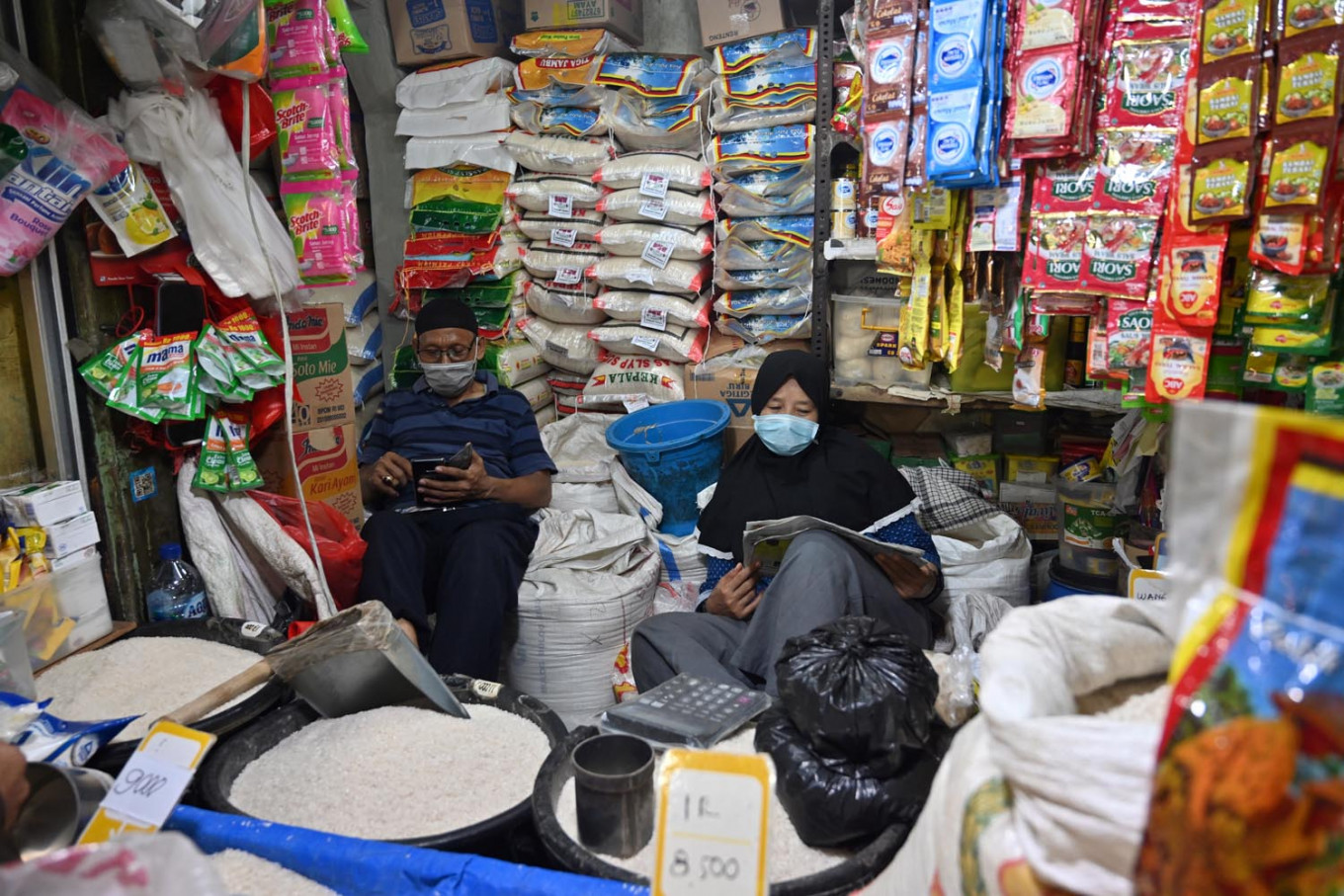Popular Reads
Top Results
Can't find what you're looking for?
View all search resultsPopular Reads
Top Results
Can't find what you're looking for?
View all search resultsEconomics of partial lockdown to contain spread of coronavirus
With 55 percent of the workforce in the informal sector, there is enough reason to worry about locking down cities completely. No work means no pay and no safety net. For the bulk of micro, small and medium enterprises (SMEs) this means a severe shock to their businesses.
Change text size
Gift Premium Articles
to Anyone
T
he heavy traffic and long lines at public transportation hubs in Jakarta only a day after President Joko “Jokowi” Widodo’s call to “work from home” to slow the rapid spread of the novel coronavirus disease COVID-19, provides three takeaways. First, many workers cannot afford to work from home. Second, employers are confused. Third, firmer emergency measures are needed to curb the virus spread.
With 55 percent of the workforce in the informal sector, there is enough reason to worry about locking down cities completely. No work means no pay and no safety net. For the bulk of micro, small and medium enterprises (SMEs) this means a severe shock to their businesses.
President Jokowi, who likes to travel around Indonesia and directly meet the people in an impromptu way in rolled up sleeves, might have been thinking of such impacts when on Thursday he was still ruling out a lockdown.
The farmers and fishermen he has been meeting with represent 27 percent of Indonesia’s workers. The rest are mostly in trade, manufacturing, construction, accommodation, food and beverage and education —about the same representation of Indonesia’s gross domestic product (GDP).
Also, only one out of five Indonesians is economically secure, according to the World Bank report Aspiring Indonesia. Around 24.8 million Indonesians live on under US$1 a day—9.22 percent of the population— and over 60 million are vulnerable to dropping into poverty.
Read also: Burdened from birth: Children raised in poverty earn 87% less as adults
The banking sector is at risk from delayed loan repayments by these vulnerable individuals and SMEs. Retailers must prepare for irrational buying behavior as the COVID-19 spread becomes more rapid and difficult to contain. Demand is moving faster than the supply side, which is experiencing supply chain shocks from limitations in economic activities elsewhere in the world.
These considerations are paramount in mapping out the potential impact of any economic shock triggered by the rapid virus spread. Unfortunately, these considerations are used to back arguments for no lockdown, when they should serve as policy clues for a partial lockdown or stricter and more aggressive measures in slowing down COVID-19.
Read also: House joins experts to push for lockdown against COVID-19
The World Health Organization has directly urged Jokowi to scale up emergency response mechanisms and declare a national emergency. Countries such as South Korea and China managed to slow down the virus as they quickly took emergency measures, including limiting people’s movement, conducting mass testing and rigorous tracing.
Our health professionals have also offered help as deaths spiked to 25 people on Thursday and the number of positive cases rose to 309 in at least 14 provinces across the archipelago. How can people work and keep the economy going with their loved ones sick or at high risk of infection? This is the simple thinking of simple people.
Governments elsewhere are facing the same problem and economies are faltering. Businesses are preparing for a global recession. Thus ensuring that people are healthy and productive to get the economy going later should come first.
A well-planned, targeted partial lockdown limiting mobility, while maintaining essential needs, is overdue. Stricter emergency measures in binding regulations are needed, besides mere appeals for social distancing.
These regulations can include listing the business sectors that may open and those which should limit operations or operate remotely. Jokowi has the benefit of a Coordinating Economic Minister close to industry players who can provide valuable input, to contain supply chain shocks and limit potential panic buying.
Read also: COVID-19: Does Indonesia need a lockdown? It depends on how you define it
It is time for companies to step up. Some enterprises have had brilliant initiatives that help SMEs with grants and emergency loans to cope with the economic shocks. Some are educating consumers on the importance of self-quarantining to slow the virus spread.
But many are still exposing workers to risk by not enforcing the “work from home” policy when they can, and by not preparing emergency measures to cushion business operations. This is disappointing especially since many claim to have adopted the “Industry 4.0” mentality, and pushed forward “digitalization” in their institutions. Again, this situation arises because of an absence of strong government measures.
Businesses and the government should prepare partial lockdowns, coordinate and ensure the stockpiling of staple needs such as rice, eggs, chicken, sugar, chilis and shallots. Banking operations to ensure minimal disruption to cashflow also should be consolidated with the financial services industry and authorities.
The announcement of the Rp 120 trillion (US$7.5 billion) state budget allocation to soften any potential economic shock shows Indonesia can afford the cost of the battle. The stimulus can be increased by reallocating non-emergency spending to focus on public health— such as medical needs, test kits, lab research and development, and turning unoccupied hotels into hospitals.
Read also: 'File your tax returns': Tax office intensifies efforts to collect taxes as budget burdens multiply
The government needs flexibility with regard to its self-imposed budget deficit cap of 3 percent of GDP. Subsidies and fiscal incentives need to be better targeted to those most vulnerable to economic shocks. Spending on housing, fuel, electricity, education and transportation comprise most of the people’s non-food spending.
Cash transfers should focus on these spending items, on top of staple needs, for the bottom 30 percent who are poor and most prone to falling into poverty. With an exponential increase in financial inclusion, with access to financial services reaching out to 76 percent of the population, it is the right moment to take advantage of this achievement for cash transfers or emergency loans.
The lack of clear emergency measures faces the business community and investors with unprecedented levels of uncertainty. The rupiah now nears Rp 16,000 against the US dollar, the weakest since the 1998 financial crisis.
The market rout not only shows the heightening risk of investment here; it may reflect a vote of no confidence in Indonesian assets. Foreign investors have dumped more than $5 billion of Indonesian stocks and bonds recently.
It is time to restore investors’ confidence in Indonesia’s government. Pak Jokowi, listen to the health experts. Take strict emergency measures: limit people’s movement in clear regulations, conduct mass testing and trace the positive cases. Trust your economic team to safeguard the economy.
This is an unprecedented situation requiring unprecedented measures. You have the power to issue strict regulations to #stayhome, or as Indonesian netizens say #dirumahaja, and slow down deaths and infections. We are all rooting for you.










